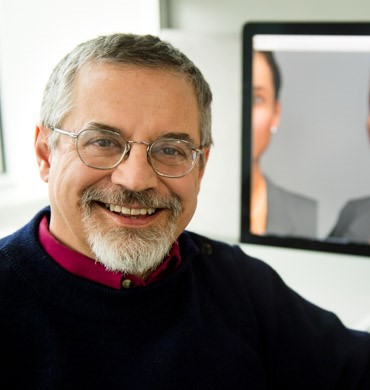
Workshop 2024
Official ICMI 2024 Workshop – November 4, 2024 (in person)
The GENEA (Generation and Evaluation of Non-verbal Behaviour for Embodied Agents) Workshop
2024 aims at bringing together researchers that use different methods for non-verbal-behaviour generation
and evaluation, and hopes to stimulate the discussions on how to improve both the
generation methods and the evaluation of the results. We invite all interested researchers to submit a
paper related to their
work in the area and to participate in the workshop. This is the fifth installment of the GENEA Workshop,
for more information about the 2023 installment, please go here.
Important dates
Submission Deadlines: All deadlines are set at the end of the day, Anywhere on Earth (AoE)
Planned Workshop programme
ALL TIMES IN SAN JOSE' LOCAL TIMEZONE (UTC-6)
- Gesture Evaluation in Virtual Reality (Deichler et al.)
- Gesture Area Coverage to Assess Gesture Expressiveness and Human-Likeness (Tonoli et al.)
- Benchmarking Speech-Driven Gesture Generation Models for Generalization to Unseen Voices and Noisy Environments (Gómez Sánchez et al.)
- Towards interpretable co-speech gestures synthesis using STARGATE (Abel et al.)
- Qualitative study of gesture annotation corpus: Challenges and perspectives (Grondin Verdon et al.)
- Sean Andrist, Stacy Marsella, Yukiko Nakano and Yaser Sheikh
Call for papers
GENEA 2024 is the fifth GENEA Workshop and an official workshop of ACM ICMI ’24, which will take place in San José, Costa Rica. Accepted paper submissions will be included in the adjunct ACM ICMI proceedings.
Generating non-verbal behaviours, such as gesticulation, facial expressions and gaze, is of great importance for natural interaction with embodied agents such as virtual agents and social robots. At present, behaviour generation is typically powered by rule-based systems, data-driven approaches, and their hybrids. For evaluation, both objective and subjective methods exist, but their application and validity are frequently a point of contention.
This workshop asks, “What will be the behaviour-generation methods of the future? And how can we evaluate these methods using meaningful objective and subjective metrics?” The aim of the workshop is to bring together researchers working on the generation and evaluation of non-verbal behaviours for embodied agents to discuss the future of this field. To kickstart these discussions, we invite all interested researchers to submit a paper for presentation at the workshop.
Paper topics include (but are not limited to) the following
- Automated synthesis of facial expressions, gestures, and gaze movements
- Audio- and music-driven nonverbal behaviour synthesis
- Closed-loop nonverbal behaviour generation (from perception to action)
- Nonverbal behaviour synthesis in two-party and group interactions
- Emotion-driven and stylistic nonverbal behaviour synthesis
- New datasets related to nonverbal behaviour
- Believable nonverbal behaviour synthesis using motion-capture and 4D scan data
- Multi-modal nonverbal behaviour synthesis
- Interactive/autonomous nonverbal behavior generation
- LLMs and foundation models in the context of non-verbal behaviour synthesis
- Subjective and objective evaluation methods for nonverbal behaviour synthesis
- Guidelines for nonverbal behaviours in human-agent interaction
We will accept long (max 8 pages) and short (max 4 pages) paper submissions, all in the same double-column ACM conference format as used by ICMI. Pages containing only references do not count toward the page limit for any of the paper types. Submissions should be formatted for double-blind review made in PDF format through OpenReview.
Submission site: https://openreview.net/group?id=ACM.org/ICMI/2024/Workshop/GENEA
To encourage authors to make their work reproducible and reward the effort that this requires, we have introduced the GENEA Workshop Reproducibility Award.
We will also host an open poster session for advertising your late-breaking results and already-published work to the community. No paper submission is needed to participate in the poster session, and these posters will not be part of any proceedings (non archival). Submission guidelines for the poster session will be available on the workshop website.
Call for posters
The GENEA Workshop at ACM ICMI 2024 will host an open poster session for advertising your late-breaking results and recently-published work to the community. Only a poster submission is required, no paper submission is needed to participate in the poster session, and these posters will not be part of any proceedings (i.e., non-archival). However, poster presentation does require a valid registration with ICMI to attend the workshop, and is subject to space constraints.
Paper topics include (but are not limited to) the following
- Automated synthesis of facial expressions, gestures, and gaze movements
- Audio- and music-driven nonverbal behaviour synthesis
- Closed-loop nonverbal behaviour generation (from perception to action)
- Nonverbal behaviour synthesis in two-party and group interactions
- Emotion-driven and stylistic nonverbal behaviour synthesis
- New datasets related to nonverbal behaviour
- Believable nonverbal behaviour synthesis using motion-capture and 4D scan data
- Multi-modal nonverbal behaviour synthesis
- Interactive/autonomous nonverbal behavior generation
- LLMs and foundation models in the context of non-verbal behaviour synthesis
- Subjective and objective evaluation methods for nonverbal behaviour synthesis
- Guidelines for nonverbal behaviours in human-agent interaction
Poster guidelines
- Poster format: 1-page poster (no larger than A0 size; portrait is recommended). There is no specific template. The poster can be designed as you want.
- How to submit: Please submit your poster draft (in PDF format) and/or poster abstract here (https://forms.gle/mxJ6uTGbXS8gb9169). We will acknowledge your submission within 24 hours. The submission deadline is 23:59, September 30, 2024 (Anywhere on Earth timezone). We will get back to you no later than October 15 to let you know if we are able to accommodate your poster at the event.
Reproducibility Award
Reproducibility is a cornerstone of the scientific method. Lack of reproducibility is a serious issue in contemporary research which we want to address at our workshop. To encourage authors to make their papers reproducible, and to reward the effort that reproducibility requires, we are introducing the GENEA Workshop Reproducibility Award. All short and long papers presented at the GENEA Workshop will be eligible for this award. Please note that it is the camera-ready version of the paper which will be evaluated for the reward.The award is awarded to the paper with the greatest degree of reproducibility. The assessment criteria include:
- ease of reproduction (ideal: just works, if there is code - it is well documented and we can run it)
- extent (ideal: all results can be verified)
- data accessibility (ideal: all data used is publicly available)
by Rodolfo Luis Tonoli, Paula Dornhofer Paro Costa, Leonardo Boulitreau de Menezes Martins Marques, and Lucas Hideki Ueda.
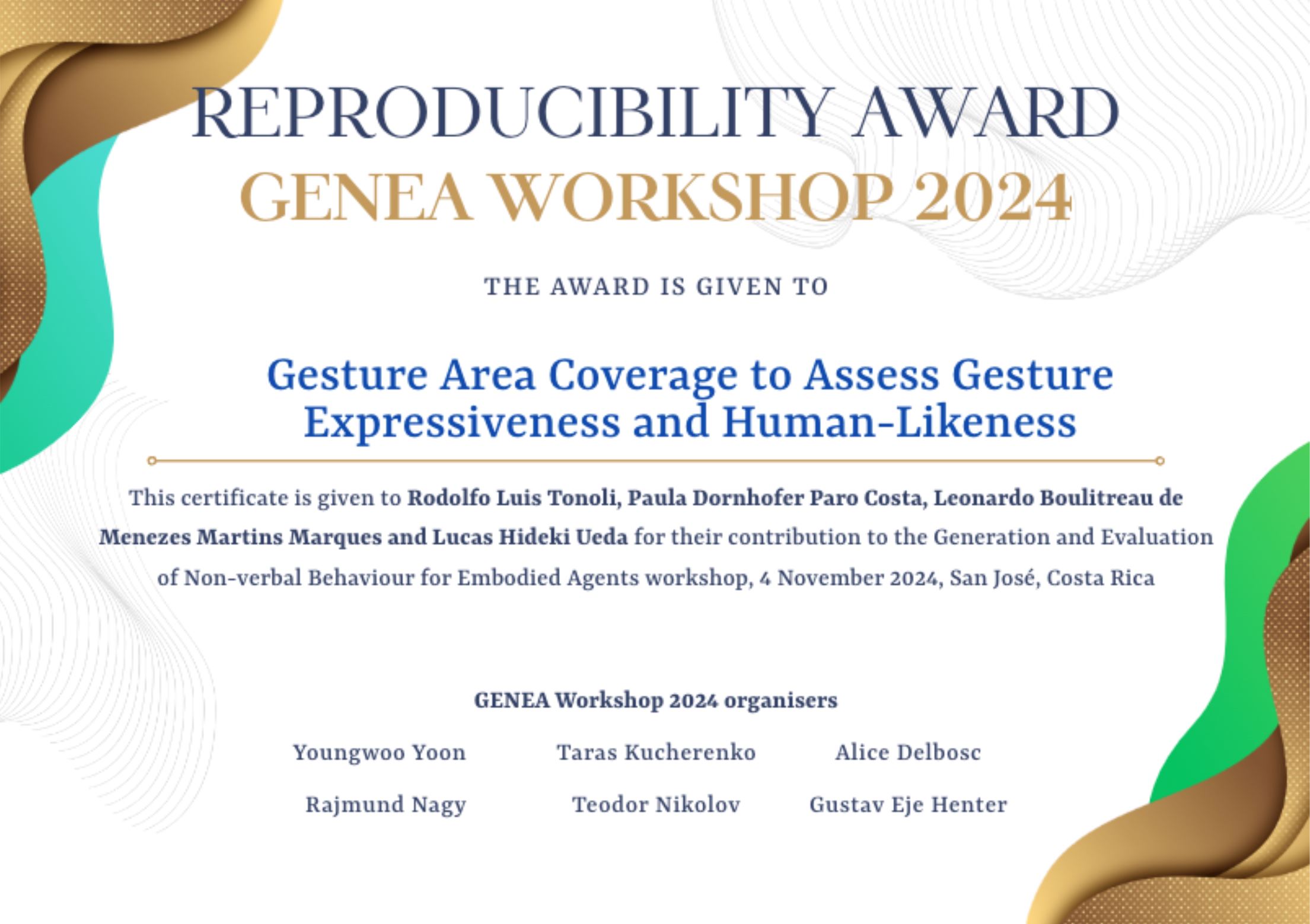
Invited speakers
Yukiko I. Nakano
Biography
Yukiko I. Nakano is a Professor in the Department of Computer and Information Science at Seikei University, Tokyo, where she leads the Intelligent User Interface Laboratory (IUI-lab). She received her M.S. in Media Arts and Sciences from the Massachusetts Institute of Technology (MIT) and her Ph.D. in Information Science and Technology from the University of Tokyo.Her research focuses on social signal processing to establish machine learning models for estimating the characteristics of multimodal and multiparty interactions, applying these models to human-agent interactions such as conversational agents and communication robots.
Her research interests include social signal processing, multimodal machine learning, nonverbal behavior modeling, and embodied conversational agents (ECAs).
She has served as Steering Committee Chair for the ACM International Conference on Multimodal Interaction (ICMI), co-chaired major conferences such as ICMI2016 and IVA2012, and co-organized the Workshop on Eye Gaze in Intelligent Human Machine Interaction from 2011 to 2014.
Stacy C. Marsella
Biography
Stacy Marsella is a professor at the Khoury College of Computer Sciences with a joint appointment in psychology. Prior to joining Northeastern, he was a research professor in the Department of Computer Science at the University of Southern California and a research director at the Institute for Creative Technologies. Previously, he held positions at USC’s Information Sciences Institute (1996-2009) and Bell Labs (1995-1996).Marsella’s multidisciplinary research is grounded in the computational modeling of human cognition, emotion, and social behavior, as well as the evaluation of those models. Beyond its relevance to understanding human behavior, the work has seen numerous applications, including health interventions, social skills training, and planning operations. His applied work includes frameworks for large-scale social simulations of towns and a range of techniques and tools for creating virtual humans, facsimiles of people that can engage in face-to-face interactions.
Marsella has served as a general chair of Autonomous Agents and Multiagent Systems and chair of Intelligent Virtual Agents. In 2010, he received an ACM SIIGART career award for his contributions to agent research. He is an associate editor of the IEEE Transactions on Affective Computing, a board member of the International Foundation for Autonomous Agents and Multiagent Systems, and on the steering committee for Intelligent Virtual Agents. He is a fellow of the Society of Experimental Social Psychologists and a member of the Association for the Advancement of Artificial Intelligence and the International Society for Research on Emotions.
Talk: Gesture Selection and Large Language Models
Abstract: Co-speech gestures convey a wide variety of meanings and can play an important role in virtual human interactions with people. Thus, it is often critical for a virtual human to use appropriate gestures. However, the automation of a virtual human’s gesture selection process faces a range of challenges. The form of a gesture conveys meaning related in varying ways to the spoken dialog. The form is also tied to the larger interaction context and the role of the speaker in that interaction. Comedians on stage, politicians during a speech and clinicians in a therapy session use different gestural forms to achieve different ends. Gesture generation techniques have attempted to address such challenges in varied ways from fully automated, data-driven techniques to approaches that require varying degrees of manual crafting. In this talk, I discuss the challenges of gesture selection, with a specific focus on metaphoric gestures that convey meaning and on tailoring the gesture selection to an interaction context. I then cover our group’s efforts to realize and evaluate a gesture selection approach that leverages the capabilities of Large Language Models to address these challenges.Accepted papers
Towards interpretable co-speech gestures synthesis using STARGATE
Louis Abel, Vincent Colotte and Slim Ouni
Qualitative study of gesture annotation corpus: Challenges and perspectives
Mickaëlla Grondin Verdon, Domitille Caillat and Slim Ouni
Gesture Evaluation in Virtual Reality
Anna Deichler, Jonas Beskow and Axel Wiebe Werner
Gesture Area Coverage to Assess Gesture Expressiveness and Human-Likeness
Rodolfo Luis Tonoli, Paula Dornhofer Paro Costa, Leonardo Boulitreau de Menezes Martins Marques and Lucas Hideki Ueda
Benchmarking Speech-Driven Gesture Generation Models for Generalization to Unseen Voices and Noisy Environments
Johsac Isbac Gómez Sánchez, Kevin Adier Inofuente Colque, Leonardo Boulitreau de Menezes Martins Marques, Paula Dornhofer Paro Costa and Rodolfo Luis TonoliOrganising committee
The main contact address of the workshop is: genea-contact@googlegroups.com.
Workshop organisers
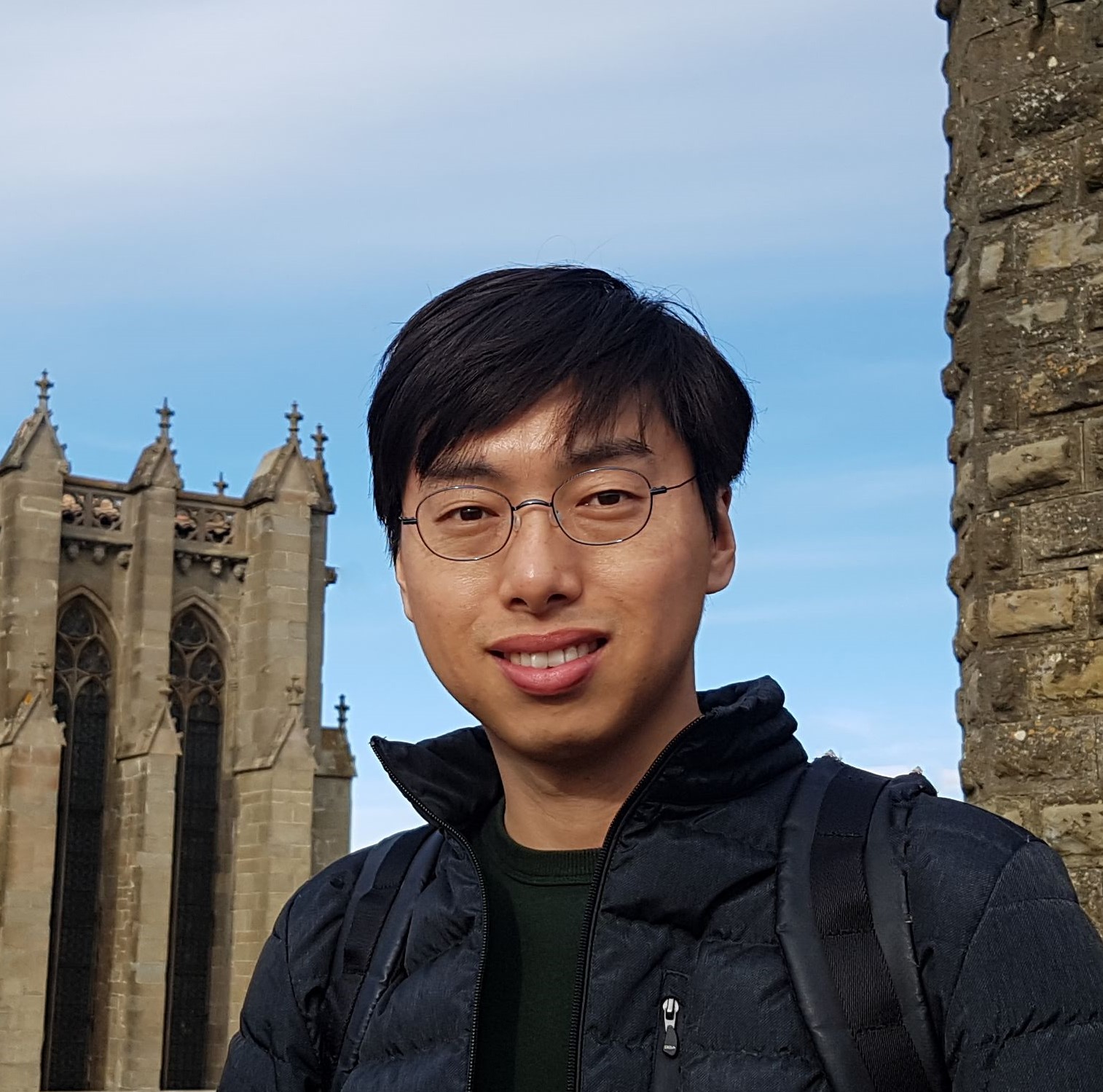
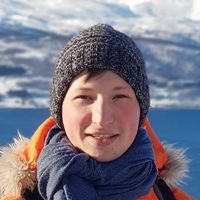
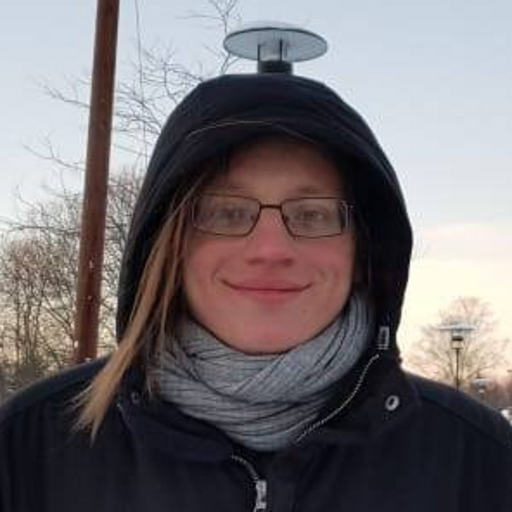
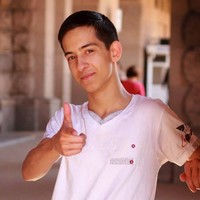
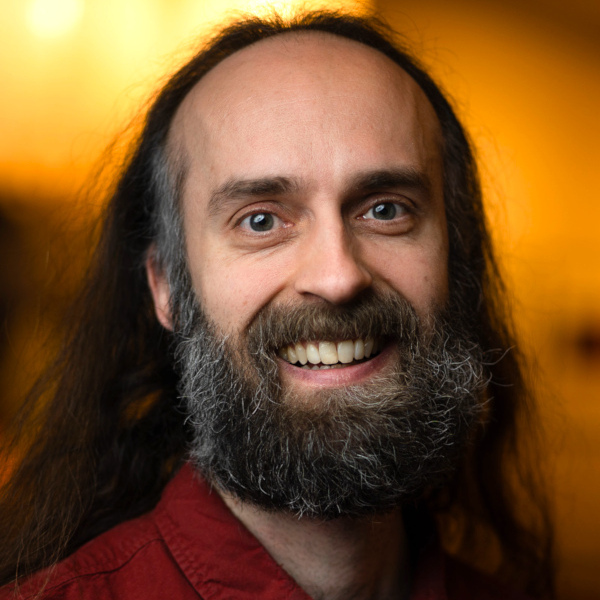

Join our community
Join our Slack space dedicated to the gesture generation research community.
In order to ensure the security and integrity of our community, we kindly ask you to fill out
this form
to obtain the invitation link.
Join us to share your work, data, interesting papers, questions, ideas, job opportunities and more.
And keep up to date with the latest workshop news by following us on X.

